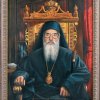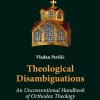After the death of Bishop Grigorije the Western Diocese was administered by Irinej, Bishop of Niš, from October 1985 until May 1986, and by Sava, Bishop of Šumadija, from July 1986 until May 1988.
The Holy Bishops’ Assembly at the regular session in May 1988 elected Archimandrite Hrizostom Stolić as a Bishop of the Western Diocese.
Bishop Hrizostom was born in 1939 in Ruma where he graduated from elementary school and middle school (High School). After High School he went to the Dečani Monastery where he took monastic vows. He was ordained to hierodeacon and hieromonk by Rt. Rev. Pavle, Bishop of Ras-Prizren. Soon afterwards he went to America to be at the service to his Church and people. He studied at the Seminary in the Russian Holy Trinity Monastery in Jordanville. He then came to Chicago and helped the pastor at Holy Resurrection Church with his duties. He was appointed temporary pastor of St. George Church in East Chicago, Indiana in 1967. He remained there until 1969. For two years he established firm spiritual roots in the community. He felt a higher calling and responded to it. In 1969 he went to the Hilandar Monastery at Mount Athos in Greece, where he remained for nineteen years. There he was elevated to the rank of archimandrite by the Patriarch of Constantinople, His Holiness Demitrius the First. At one time he was elected a Dean of Mount Athos. He was a librarian in the Hilandar Monastery. Along with the spiritual growth he advanced his intellectual dimensions. He published the Lives of the Holy Fathers in two volumes and the Liturgy of St. Apostle James, which he translated into the Serbian language.
The Holy Bishops’ Assembly at its session from May 14–24, 1988, elected archimandrite Hrizostom as a Bishop of the Western American Diocese. Upon his election a high delegation, consisting of two prominent bishops of the Serbian Orthodox Church, Bishop Sava (Vuković) of Šumadija and Bishop Stefan (Boca) of Žiča, were sent to the Patriarch of Constantinople, His All-Holiness Demitrios the First, to ask for His blessing and canonical release for archmandrite Hrizostom, since Mount Athos is under the canonical jurisdiction of the Patriarchate of Constantinople. At that time Patriarch Demetrius exclaimed that the Hilandar Monastery has lost an extraordinary monk but the Serbian Church has gained an extraordinary bishop. He ruled the Diocese until 1992 when he was elected Bishop of the Diocese of Banat.
After assuming episcopal duties in the Western Diocese his priority was to procure a Bishop’s Residence. A private residence was purchased soon after. His short stay prevented him from accomplishing much more, but he continued his diligent work in his new Diocese in Banat.
In 1992 upon assuming his episcopal duties in the Diocese of Banat, in addition to his hierarchical ministry, he instantly instigated many projects. He successfully developed a diocesan publishing ministry, remodeled the episcopal seat and built Monastery Srediste, near Vrsac.
In May of 2003, at The Holy Assembly of Bishops of the SOC, Bishop Hrizostom was elected for the vacant Diocese of Žiča, one of the oldest and most significant dioceses of the Serbian Church. Upon being enthroned in The Monastery Žiča, by Patriarch Pavle, he immediately commenced his episcopal and evangelical ministry. Under his guidance the publishing ministry of this diocese blossomed. He re-launched the diocesan publication “Žički Blagove¬snik”, published many translations from Greek, English and Russian language, composed, edited and published, in Serbian language, prescribed Gospel and Epistle readings for every day of the liturgical year as well as the hierarchical Service Book. He also published the Menaion (annual fixed cycle of services) for the entire year in twelve volumes.
He worked tirelessly on many construction projects too, leaving the mark of his knowledge and love for the church architecture on all of them. The Diocesan Seat, within the Žiča Monastery, was completely remodeled adhering to the architectural style of the original structure. In order to preserve the serenity of the Žiča Monastery and to protect the monastic life from everyday turbulence of the diocesan administrative work, he built a graceful diocesan center in the City of Kraljevo and transferred the Diocesan Seat there. He also built the Rujan Monastery near Uzice, in which he expressed the desire to be buried, awaiting the second coming of our Lord and resurrection from the dead.
After serious illness bishop Chrysostom fell asleep early in the morning on December 5/18 of 2012. His last words were: “O Lord, grant me what I desire”!
The bishop was known for his love of Orthodox worship, especially the Liturgy, and his devout adherence to Orthodox customs, traditions, and practices. He would often serve all-night vigil services, thus adhering to the monastic tradition of the Mount Athos, where he was spiritually raised as a monk.





